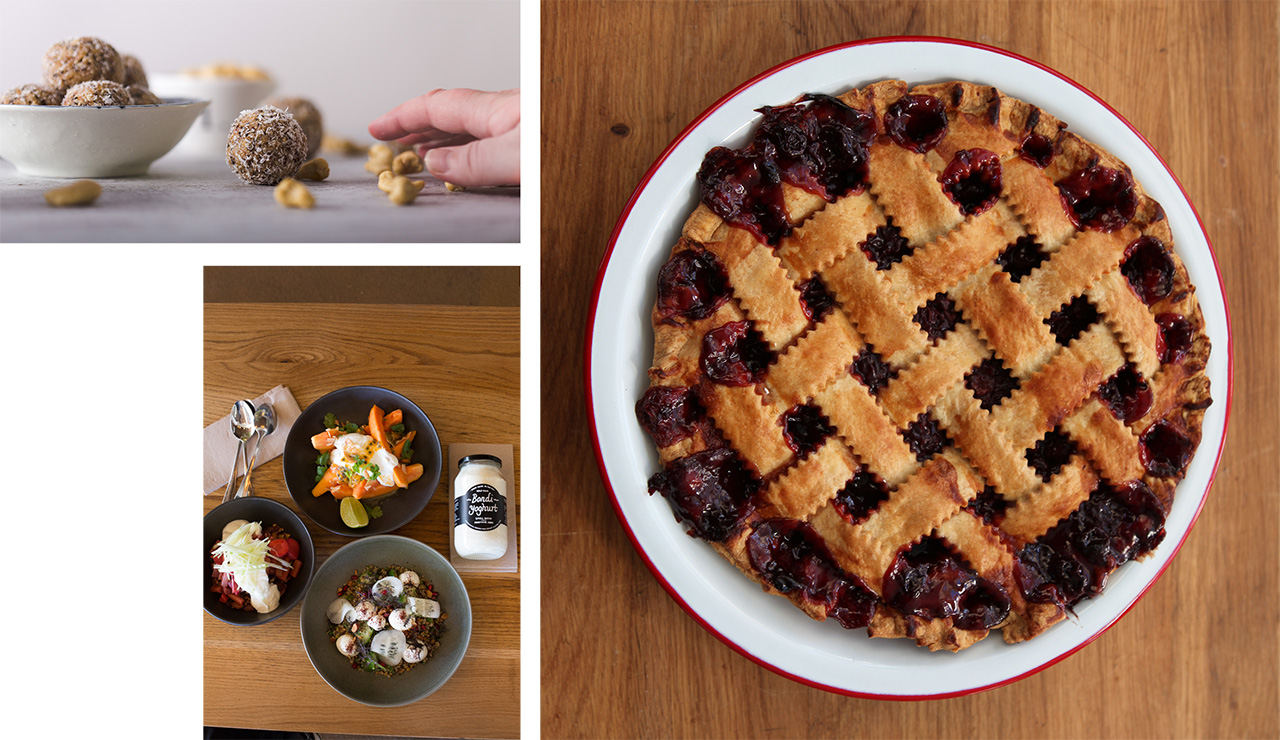News feed

Brownie cookies filled with vanilla bean buttercream from The Spotted Cow Cookie Co, one of FoodByUs’ first ‘makers’
Credit: Supplied courtesy of FoodByUs
Ten years ago, if someone told you that one day you’d ride in a stranger’s car to a rented stranger’s apartment where you’d have food cooked and delivered to you by a stranger all done using an app on your phone, you’d likely have made a dash for the hills and spent the remainder of your days living off the grid.
Even though Uber, Airbnb and their ilk are now firmly ensconced in our lives, the prospect of the latter – eating a meal prepared by a complete stranger – still strikes a strange chord, at least personally speaking. Perhaps it’s a lingering hangover from my childhood, a lifelong aversion to taking candy from strangers coupled with a predilection for DIY, but it’s also one that three Sydney-based entrepreneurs hope won’t deter you from making use of their new app FoodByUs, which launched today in Sydney and plans to expand to Melbourne later this year.
Billed as an Uber for home cooks, FoodByUs is a burgeoning online marketplace that wants to connect passionate home cooks, dubbed ‘makers’, with those in need of a home cooked meal. It’s the latest edition to a collaborative sharing economy whose growth shows no sign of abating through the increasing use of apps that encourage ride sharing, home sharing, and the sharing of more mundane tasks like sharing manual labour, household tools and pet-sitting. A report commissioned last year by the NSW Department of Finance, Services and Innovation (conservatively) estimated that the collaborative economy sector contributes around $504 million to state coffers annually, with an estimated 45,000 users having earned their primary or additional income through collaborative services.
As our national appetite for haute home cooking, food miles and event dining reaches a fever pitch of comical proportions; when the dangerously archaic hot takes of Pete Evans are worthy of weekly headlines; when outsourcing is the new locally-sourced and staying in has become a government mandated pastime, the climate, it would seem, is very ripe for a service like FoodByUs.

Credit: Supplied courtesy of FoodByUs
The app itself had its initial inception in only February of this year. Two of its founders, Gary Munitz and Tim Chandler, previously launched restaurant delivery service Menulog; the third, Ben Lipschitz, is a former colleague and the founder of his now-sold, fold-up shoe business, Flipsters. With their combined experience and the backing of “a number of high net-worth and some institutional investors”, the three embarked on a venture to, as Lipschitz tells it, “create a community where cooks can sell their food to other people and buyers can, more importantly, have access to something they’ve never had before, which is to meet the maker and have local, authentic cuisine.
“We thought, ‘this is a really great thing that we want to build’; also, it’s an Australian first, and we thought ‘let’s do it, nobody’s doing it.'”
While Lipschitz acknowledges that “there are seeds of the [same] idea beginning to take hold in different geographies, there isn’t a dominant player” in the field – at least not one that privileges the ‘meet your maker’ ethos FoodByUs prides itself on.
The transaction itself is simple enough: you visit the website or download the app, select the food you want (you can filter by geography, cuisine or dietary restrictions and requirements, which aren’t necessarily the same thing) and check out. Delivery costs a flat rate of $5 using “a number of courier solutions”, or buyers are able to pick up the food from the maker, provided they’re comfortable with a face-to-face transaction. Makers are also able to regulate their schedules, availability, product and prices to suit their requirements and appetite.
Lipschitz says that all makers will operate as “completely independent” sole practitioners “running their own little food business”; while some work full-time on their operation, for many it’s a part-time outlet to “indulge in their passion for cooking” with the added benefit of a supplemented income (FoodByUs takes a 20% revenue share). The app soft-launched earlier in August, but the process of recruiting makers began much earlier through initial testing in similar environments – outdoor farmer’s markets, Instagram, YouTube and finally in the home kitchens of budding food enterprises. For many, including a cupcake maker named Carmella, the long-term goal is to turn their passion into a full-time occupation:
“She’s made it really clear that as soon as she can hit that button to leave her job and make cupcakes all day, that’s what she’s going to do.”
Preparing food for sale at a domestic premises means there’s a litany of food safety issues to consider. It’s also the responsibility of each food business – in this case, the makers – to understand relevant food safety requirements and operate in compliance with them. How, then, will FoodByUs ensure that each of its makers adheres to the kind of food preparation and health and safety standards of larger scale commercial enterprises?
“It’s a really important question,” says Lipschitz, “and we definitely take food safety very seriously.
“Fortunately, in terms of selling food from home, the regulations are very clear on that and we make sure our makers understand that. Every local council, or sometimes on a state level, does have rules on selling foods that you make at home, so that’s sort of the legal side, but we ourselves don’t just let anyone make for us. Some of our makers are former professional chefs, some of them are [former] Masterchef contestants, and so we want to keep that high quality. So we do a quality and taste test before anyone is allowed to go onto the network, so that means that they must submit their food to us and also their identification, so there’s an accountability there.”
Every single purchase must also of necessity be reviewed by the buyer to ensure standards are maintained in real time, and Lipschitz adds that if a maker’s rating drops or they get a bad review then “we’re onto it, and we’re going to take the right course of action.”
FoodByUs will not inspect kitchens as part of their process, however makers must “let councils know of their intentions to cook from home”. As far as inspections are concerned, “that all absolutely falls under the things that councils are best equipped to do.” When it comes to dealing with allergies and the kinds of dietary requirements that are fast becoming the norm, makers will face the same challenges as any food business and are given the opportunity to label their food “vegan, vegetarian, organic” as required, especially when it comes to allergens – life-threatening and lifestyle alike.

Credit: Supplied courtesy of FoodByUs
In what’s fast approaching a saturated food delivery market, FoodByUs does not consider itself a competitor to established businesses, Menulog amongst them. UberEATS, Foodora, Deliveroo and any other number of services “are all about restaurants”, says Lipschitz, “[they’re] all about convenience and getting your food now for now, I don’t think you’re ever going to be able to remove that need for convenience, and it’s definitely not the space that we’re here to play in.”
Instead, Lipschitz sees FoodByUs as offering to dining what Airbnb does to accomodation – “something different, something fancy.
“If you do want an Argentinian empanada, or that gluten free meal that you’re after, and you’re happy to put a little bit of pre-planning into it, like a day or two, then you’re going to get that specialised meal. You’re going to be able to chat to them through the website, which is something we allow, then you’re really going to be able to build that food sharing community and I think that is the space we’re trying to occupy.”

Credit: Supplied courtesy of FoodByUs
On the day they’ve gone live to the general public, FoodByUs employs a staff of seven including Munitz, Chandler and Lipschitz, with the rest involved in marketing, sales and operations. As part of the service, the team also assist makers with their photography during their launch stages after their contributions are approved by a panel of taste testers.
However, Masterchef this is not – tastings are blind, not in front of aspiring applicants, and the process sounds far less arduous than anything involving Matt Preston.
“Today, someone came in with an organic vegan brownie and cupcake, and it was great,” says Lipschitz. “Her name’s Sophia and she’s had an 18-month-old baby in a pram that she was rolling around and dropped the food off with her application form. She’s going to be approved.
“We’ve also got a maker called Birgitta who’s a former professional and has been baking for 11 years. She makes a salted caramel cheesecake that’s pretty special. It’s really something. I could taste test that many times if I had to.”
Tile and cover image: Supplied courtesy of FoodByUs










